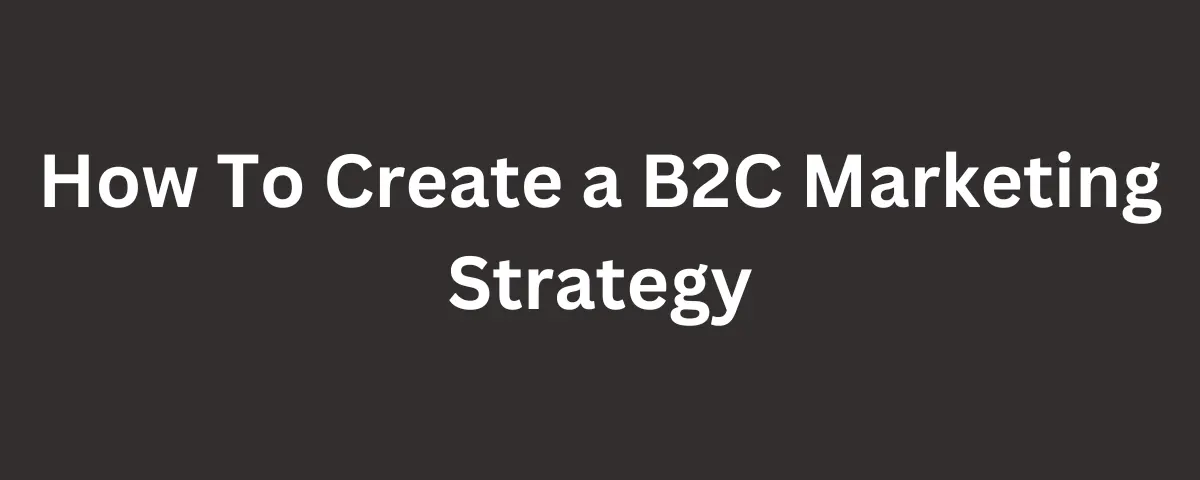B2C marketing has emerged as a powerful strategy for companies to connect with their target audiences. However, navigating the ins and outs of B2C marketing can be daunting, with businesses facing challenges such as standing out in a crowded marketplace, building brand trust, and adapting to ever-evolving consumer behavior. In this article, we will provide you with the strategies, and best practices that successful brands employ to captivate and engage individual consumers effectively.
What is B2C Marketing?

B2C marketing, or business-to-consumer marketing, refers to the strategies used by businesses to promote and sell their products or services directly to individual consumers or end-users.
In a B2C model, the target audience consists of the general public or specific users, rather than other businesses. The primary goal of B2C marketing is to drive consumer demand, build brand awareness, and ultimately increase sales and revenue.
Examples of B2C companies include consumer packaged goods (CPG) manufacturers, retail stores, e-commerce businesses, restaurants, entertainment providers, and various service providers targeting individual consumers directly.
The goal of this business is to connect directly with the users of other products and make the products available to them.
Why is B2C marketing important?
1. Driving consumer demand
Get 50% Discount to Master ALL Aspects of Digital Marketing That Can Earn You $2,500 - $5,000 a month (Even if you are a complete beginner!)
Our students that intentionally implement what they learn from our digital marketing course make back the entire course fee within a single month or more after completing our course because our course gives them many income generating options with unlimited earning potential with no age or location barrier. The best part is no technical skills are required.
An opportunity to change your lifestyle and make money working from anywhere in the world. The results our students get from our digital marketing course prove this could be applied to any market or country and that it is designed for any skill level and work background.
*By signing up, you agree to our privacy policy and terms of service.
The primary goal of B2C marketing is to create demand for a company’s products or services among individual consumers. Effective marketing campaigns can increase brand awareness, generate interest, and ultimately lead to sales for your product.
2. Connecting with Target Audience
B2C marketing allows businesses to connect directly with individual consumers, enabling them to tailor their marketing strategies to meet the specific needs and preferences of their target audience.
3. Promoting new products or services
B2C marketing also plays a crucial role in introducing and promoting new products or services to the consumer market. It helps generate awareness, educate consumers, and create demand for new offerings.
Benefits of B2C Marketing
The benefits of B2C (business-to-consumer) marketing include:
1. Increased Sales
When you target the right audience with the right message, B2C marketing can help boost sales and revenue by encouraging customers to purchase their product or services to enjoy the benefits.
2. Improved Customer Relationships
B2C marketing campaigns can enhance customer experience by providing relevant and engaging content, leading to increased customer loyalty and repeat purchases.
3. Better Understanding of Customer Needs
With B2C marketing, you provide valuable insights into customers’ preferences and behaviors, allowing businesses to tailor their marketing efforts effectively to gain their customer attention.
4. Increased Brand Awareness
B2C marketing helps increase brand visibility by reaching a wider audience and creating a positive brand image, which can help businesses stand out in the market from their competitors.
B2B marketing vs B2C marketing

When comparing B2B marketing to B2C marketing, it becomes evident that the strategies and approaches employed in targeting businesses versus individual consumers differ significantly. Let us look at some of the comparisons of B2B and B2C marketing:
1. Target Audience
- B2B marketing targets other businesses, organizations, or professionals who make purchase decisions for their companies or clients.
- B2C marketing targets individual consumers who make purchases for personal or household use.
2. Decision-making Process
- B2B purchasing decisions often involve multiple stakeholders, longer sales cycles, and more complex decision-making processes.
- Individuals or households typically make B2C purchasing decisions and are often based on personal preferences, emotions, and impulses.
3. Buying Motivations
- B2B buyers are primarily motivated by factors like return on investment (ROI), cost savings, efficiency, and competitive advantages.
- B2C buyers are often driven by emotional factors, personal needs, desires, and aspirations.
4. Marketing Strategies
- B2B marketing tends to be more informational, educational and focused on highlighting solutions to business problems or challenges.
- B2C marketing often relies on emotional appeals, storytelling, and creating personal connections with consumers.
5. Channels and Tactics
- B2B marketing commonly utilizes channels like trade shows, industry events, email campaigns, content marketing, and personal selling.
- B2C marketing leverages channels like social media, influencer marketing, television and print advertising, retail promotions, and e-commerce platforms.
6. Relationship Building
- B2B marketing emphasizes building long-term relationships with clients, fostering trust, and providing ongoing support and services.
- B2C marketing typically focuses on driving short-term sales and building brand loyalty through customer experiences and emotional connections.
7. Metrics and KPIs
- B2B marketing metrics often include lead generation, customer acquisition costs, account-based metrics, and sales pipeline metrics.
- B2C marketing metrics may focus on website traffic, social media engagement, conversion rates, customer lifetime value, and sales volumes.
You can learn about the difference between B2B marketing and B2C marketing when you acquire and hone your digital marketing skills by enrolling in some or all of the courses to know who is your target audience and how to reach them using different formats.
B2C Marketing Channels
1. Social Media
Platforms like Facebook, Instagram, and Twitter are crucial for B2C marketers to create brand awareness, engage with customers, and drive sales through personalized content and interactions.
2. Email Marketing
An essential channel for B2C businesses to build relationships with customers, share personalized communications, offer promotions, and drive sales through newsletters, exclusive offers, and reminders.
3. Content Marketing
Utilizing blog posts, videos, podcasts, and other content formats to provide value to customers, boost search engine rankings, and establish authority in the industry.
4. Search Engine Optimization (SEO)
Enhancing online visibility by optimizing website content with relevant keywords and thought leadership to improve search rankings and attract organic traffic.
5. Paid Social Media Ads
Complementing organic social media efforts with targeted ads on platforms where the target audience is most active to increase reach and engagement.
6. Influencer Marketing
Leveraging high-profile influencers to promote products or services to their audience, benefiting from their credibility and reach in the B2C market.
7. Display Advertising
Using visually appealing graphical ads displayed as banners or interactive formats to grab users’ attention and drive brand awareness.
How to create a B2C marketing strategy

1. Identify your goals
Start by outlining specific, measurable objectives such as increasing website traffic, boosting sales, improving brand awareness, or enhancing customer engagement. When you set clear goals, you can align your marketing efforts with your business objectives and track progress effectively.
Whether aiming to acquire new customers, retain existing ones, or launch a new product, having well-defined goals provides direction and focus for your B2C marketing strategy, guiding decision-making and resource allocation to achieve desired outcomes efficiently.
2. Define your target audience
Create detailed buyer personas based on the demographics, behaviors, interests, and pain points of your ideal customers. This allows you to understand who your customers are so you can tailor your messaging, product offerings, and marketing channels to resonate with their needs and preferences.
This can done through segmenting your audience effectively, so you can deliver personalized experiences, increase engagement, and drive conversions. When you utilize your resources efficiently, it helps you to optimize your marketing efforts, and ultimately build stronger connections with consumers in the competitive B2C landscape.
3. Develop a unique value proposition
Creating a unique value proposition is crucial in B2C marketing to differentiate your brand and offerings effectively in the market. Start by understanding your target audience’s needs and highlighting what sets your product or service apart from competitors For instance, digital marketing skill institute is a highly sorted institute that has trains over 6000+ students on acquiring digital marketing skills with its world-class courses.
By clearly communicating the benefits customers will receive ensure your value proposition is concise, compelling, and customer-centric. A strong value proposition not only attracts customers but also establishes a clear and compelling reason for them to choose your brand over others in the competitive B2C market.
4. Create a content strategy
Developing a content strategy is vital in B2C marketing to engage and connect with consumers effectively. Start by understanding your target audience’s preferences, interests, and pain points to create content that resonates with them. Define your goals, whether it’s brand awareness, lead generation, or customer retention, and align your content strategy accordingly. Plan a mix of content types to cater to different consumer preferences. Consistently produce high-quality, valuable content that educates, entertains, or inspires your audience to drive engagement, build brand loyalty, and ultimately, convert leads into customers.
5. Create engaging content
Crafting engaging content is a cornerstone of successful B2C marketing strategies. To create content that captivates your audience, focus on storytelling, visual appeal, and relevance. Tailor your content to address consumer needs, interests, and pain points while maintaining a consistent brand voice. Utilize various formats such as videos, infographics, and interactive posts to keep your audience interested and entertained.
Incorporate calls-to-action to encourage interaction and drive conversions. When you deliver valuable, entertaining, and personalized content that resonates with your target audience, you can foster deeper connections, increase brand loyalty, and drive customer engagement to your business.
6. Optimize Your Content for SEO
Incorporating SEO optimization into your content strategy is crucial for enhancing visibility and attracting organic traffic in B2C marketing. Start by conducting keyword research to identify relevant terms and phrases your target audience uses to search for brands and industries. Integrate these keywords naturally into your content, including titles, headings, meta descriptions, and body text.
Focus on creating high-quality, valuable content that addresses user intent and provides solutions to their queries. Optimize images, improve site speed, and ensure mobile-friendliness to enhance user experience and search engine rankings.
7. Leverage Social Media to connect with your Audience
With billions of active users across various platforms, social media offers a direct channel to connect with your target audience and build brand awareness. Start by identifying the platforms where your ideal customers are most active and create a strong presence there. Share engaging content, such as product updates, behind-the-scenes glimpses, user-generated content, and valuable industry insights. Encourage interaction by asking questions, running contests, and responding promptly to comments and messages.
Additionally, consider leveraging social media advertising to reach a broader audience with targeted ads and sponsored posts. By consistently providing value and fostering a sense of community, you can strengthen brand loyalty and drive conversions through social media channels.
8. Plan promotional campaigns and offers
Strategically planning promotional campaigns and offers is a key component of successful B2C marketing strategies. When you create compelling offers such as discounts, limited-time deals, loyalty programs, or exclusive perks to incentivize purchases and drive customer engagement. it helps you to generate a lot of leads and traffic for your business and increase sales. you can utilise some of these channels like email marketing, social media, and paid advertising to promote your campaigns and reach a wider audience. By planning engaging promotional campaigns and offers, you can attract new customers, retain existing ones, and boost sales in the competitive B2C landscape.
9. Measuring and optimizing
It involves continuously tracking and analyzing the performance of your marketing efforts to identify what’s working and what needs improvement.
Start by setting clear, measurable goals and key performance indicators (KPIs) aligned with your overall objectives, such as website traffic, lead generation, conversion rates, or customer acquisition costs. Utilize tools like Google Analytics, social media analytics, and customer relationship management (CRM) software to collect and analyze data on your marketing campaign’s performance.
Once you have the data, regularly review and interpret it to gain insights into your audience’s behavior, preferences, and engagement levels. Based on these insights, you can optimize underperforming campaigns, refine your targeting, or pivot your messaging and content strategy to better resonate with your target audience. This ongoing process of measurement and optimization ensures that your B2C marketing efforts remain effective, efficient, and aligned with your business goals.
B2C Marketing Tools
B2C (Business-to-Consumer) marketing involves various tools and platforms to effectively reach and engage with individual consumers. Here are some common and useful B2C marketing tools:
1. Social Media Management Tools: These tools help businesses manage their social media presence across multiple platforms. Examples include Hootsuite, Buffer, and Sprout Social.
2. Email Marketing Platforms: Email marketing tools allow businesses to create, send, and track email campaigns, newsletters, and automated sequences. Popular options include Mailchimp and HubSpot.
3. Content Management Systems (CMS): CMS platforms like WordPress, and Wix enable businesses to create and manage their websites, blogs, and online content.
4. Customer Relationship Management (CRM) Software: CRM tools like Salesforce, HubSpot CRM, and Zoho CRM help businesses manage customer data, interactions, and relationships.
5. Marketing Automation Platforms: These tools automate various marketing tasks, such as lead nurturing, email campaigns, and personalized content delivery. Examples include HubSpot Marketing Hub, Marketo, and Zapier.
6. Search Engine Optimization (SEO) Tools: Tools like Ahrefs, SEMrush, and Moz help businesses optimize their websites and content for better search engine visibility.
7. Analytics and Reporting Tools: Google Analytics, and Search Console provide valuable insights into website traffic, user behavior, and marketing campaign performance.
How to Overcome Challenges in B2C Marketing
1. Stand out by offering a superior product or developing a unique marketing strategy that will give you an edge over your competitors.
2. Consistently create and distribute high-quality, valuable content that educates and engages your audience about your service.
3. Stay agile and anticipate changing consumer preferences by leveraging data analytics and market research to know what the marketing wants and how to tailor your product to meet the demands.
4. Allocate resources wisely, measure performance consistently, and optimize strategies for maximum impact and efficiency to yield positive returns.
Conclusion
B2C marketing, or business-to-consumer marketing, is a vital strategy for businesses to connect with individual consumers, drive sales, build brand awareness, and foster customer loyalty. When you understand consumer behavior, you can create engaging content, utilise various marketing channels, and implement personalized strategies that help businesses reach their target audience and achieve their marketing goals.
If you want to learn more about how businesses relate with their customer for your business then, click here to learn how we can help you achieve that.
FAQs
How can businesses improve their B2C marketing efforts?
- Utilize social media platforms to engage with customers and build brand awareness
- Implement a seamless customer experience across various channels to enhance engagement
- Leverage artificial intelligence tools to optimize marketing campaigns and enhance targeting
- Utilize social media platforms to engage with customers and build brand awareness
- Collaborate with influencers to build trust, credibility, and reach a wider audience
Disadvantages of B2C Marketing
Despite its benefits, B2C marketing also comes with some challenges:
1. Price Sensitivity: Consumers are often price-sensitive, requiring businesses to offer discounts or promotions to compete effectively in the market.
2. Customer Fickleness: Consumers can be unpredictable in their purchasing behavior, making it challenging to build long-term relationships and retain customers consistently.
3. Market Saturation: The B2C market is highly competitive and crowded, making it essential for businesses to differentiate themselves and stand out amidst the noise
Related resource
16 Top Digital Marketing Trends That You Should Know In 2024
How To Use AI In Digital Marketing To Grow Your Business
How to Create an Effective Content Distribution Strategy
Top 20 Content Distribution Channels To Reach Your Audiences


